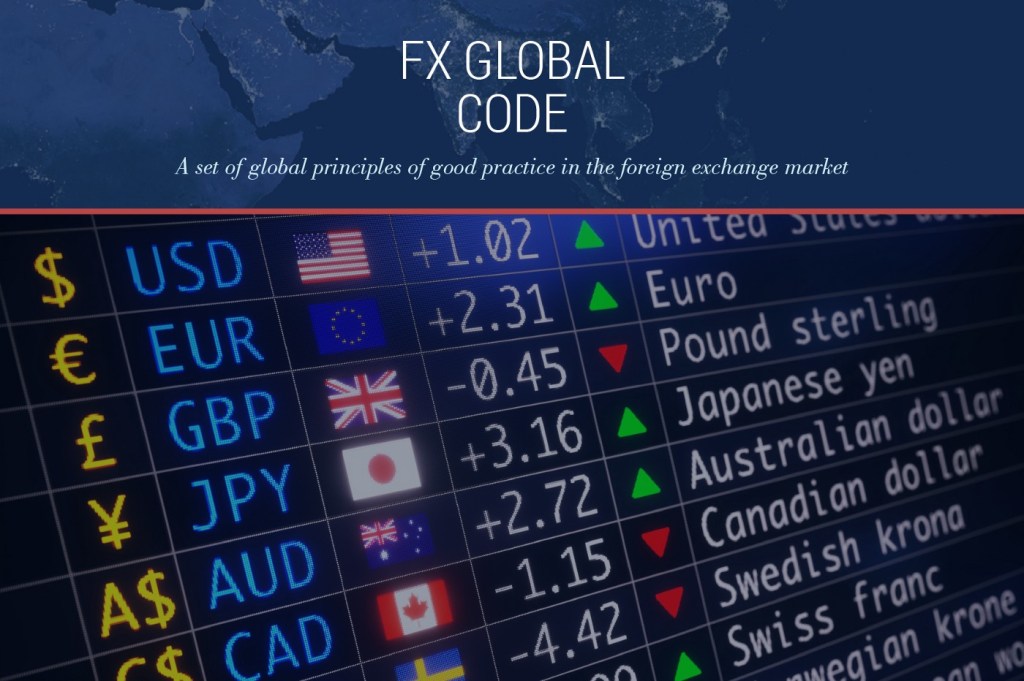
For most, six trillion of anything is an unimaginable sum. In the world of foreign exchange (FX), $6 trillion of trading volumes is just a typical day in the market.
The FX market is the largest financial market in the world, and it plays a pivotal role in facilitating the flow of capital in support of international trade and investments. The FX market serves as a public good and its integrity is important for maintaining the public’s trust in the financial system. Therefore, every market participant, regardless of its size and complexity, has an interest and a role in contributing to a fair and effective market.
The FX Global Code is a set of principles that play a pivotal role in upholding the conditions for an open marketplace where diverse participants can operate in a fair and transparent way. Market participants demonstrate their commitment to the Code and good practices in the wholesale FX market by publishing a signed statement of commitment.
In April, the Federal Reserve Bank of New York renewed its commitment to the Code, and we expect the organizations that we interact with, such as our FX counterparties and member organizations that participate in the New York Foreign Exchange Committee, to do the same. Although not all of the Code’s principles apply directly to the New York Fed’s FX operations, signing the statement of commitment demonstrates our recognition of the Code’s value both for our own institution, and for promoting the integrity and effective functioning of wholesale FX markets.
The Code challenges organizations to think critically about their role in the market and places a spotlight on the importance of good conduct. Moreover, the Code serves as an international benchmark against which firms can assess not only their own internal practices, but also those of their FX counterparties, platforms and vendors. FX participants should understand whether the firms they engage with are knowledgeable about the Code, and, importantly, whether they have made strides in incorporating the principles into their operating models.
As the FX market evolves over time, it is vital that the Code adapts along with it and remains fit for purpose. Last July, the Global Foreign Exchange Committee, an industry group comprised of both public and private sector representatives, completed its first comprehensive review of the Code since it launched in 2017. Input from the full spectrum of market participants was critical in this process and is reflected in the updated Code. Contributions from the buy-side — including asset managers, hedge funds, and corporations — were particularly helpful in further promoting disclosures and transparency and introduced debate on important topics resulting in the advancement of good practices. Broadening Code adoption among buy-side participants remains a focal point for the New York Fed because we recognize that diverse representation is essential to the relevance, effectiveness, and longevity of the Code.
While the Code is not law or regulation, sustainable, fair, and effective markets depend upon a continuous commitment from all market participants to adhere to its principles, particularly as the FX market continues to evolve. We must not remain complacent. We strongly encourage all organizations to support and contribute to market integrity, regardless of the size or complexity of their FX operations. Firms should review their business practices against the Code’s principles and consider formalizing their dedication to good practices by signing a statement of commitment and posting it to a public register.
Working together, we can promote a robust, fair, liquid, open, and appropriately transparent FX market that benefits all market participants as well as the broader public.
Lorie K. Logan is an executive vice president in the Markets Group at the New York Fed and manager of the System Open Market Account (SOMA) for the Federal Open Market Committee (FOMC), and recently was named as the next president and CEO of the Federal Reserve Bank of Dallas. Ms. Logan is a senior ex-officio member of the New York Foreign Exchange Committee.
Anna Nordstrom is a senior vice president in the Markets Group at the New York Fed and is head of the International Markets function. Ms. Nordstrom is a senior ex-officio member of the New York Foreign Exchange Committee and is the U.S. representative on the Global Foreign Exchange Committee.
This article was originally published by the New York Fed on Medium.
The views expressed in this article are those of the contributing authors and do not necessarily reflect the position of the New York Fed or the Federal Reserve System.










